Survey Reports Statistics of Horse Ownership

In the spring of 2010, American Horse Publications conducted a nationwide online survey to collect facts about the horse industry. More than 10,000 responses were collected from horse owners and managers.
Of those who responded to the survey, 90% were female. More than half the respondents were between the ages of 45 and 65. In 85% of the represented households, either one or two family members were involved with horses.
Pleasure riding was the discipline of choice for almost half the respondents, with 35% indicating they enjoyed riding competitively. Nine of ten respondents owned horses and one of five classified themselves as farm or barn managers. Only about one in five respondents owns a horse that is insured.
Two-thirds of horse owners had the same number of horses in 2010 as they did in the previous year. Among owners who plan to have a different number of horses in the near future, 18.7% intend to add horses while 14.7 think they will own fewer horses. This may indicate the beginning of an upward swing for the industry. Horse owners in younger age brackets are more likely to add horses in the future, while owners who are 65 years old or older are less likely to own more horses than they do at present.
Not surprisingly, individuals in the highest income brackets tend to own more horses than those with lower incomes. The average number of horses owned by an individual was close to equal across all age groups.
About 80% of horse owners indicated they cared for their own horses, even though 40% of horses were boarded on property not owned by the horse owner. Riding lessons were an expense for 40% of horse owners, while one out of three horse owners pays for someone to train the horse.
Most horse owners said they participated in about the same number of competitions—about five per year—as they had in recent years, and planned to stay at this level in the near future. However, increasing costs of fuel were likely to cause some owners to enter and travel to fewer competitions. Prices for horse feed and hay have risen, as have veterinary charges, and these changes have influenced some owners to investigate additional sources of income to maintain their horse-keeping expenses. Other owners said they might have to get rid of some of their horses because they couldn’t afford their care.








